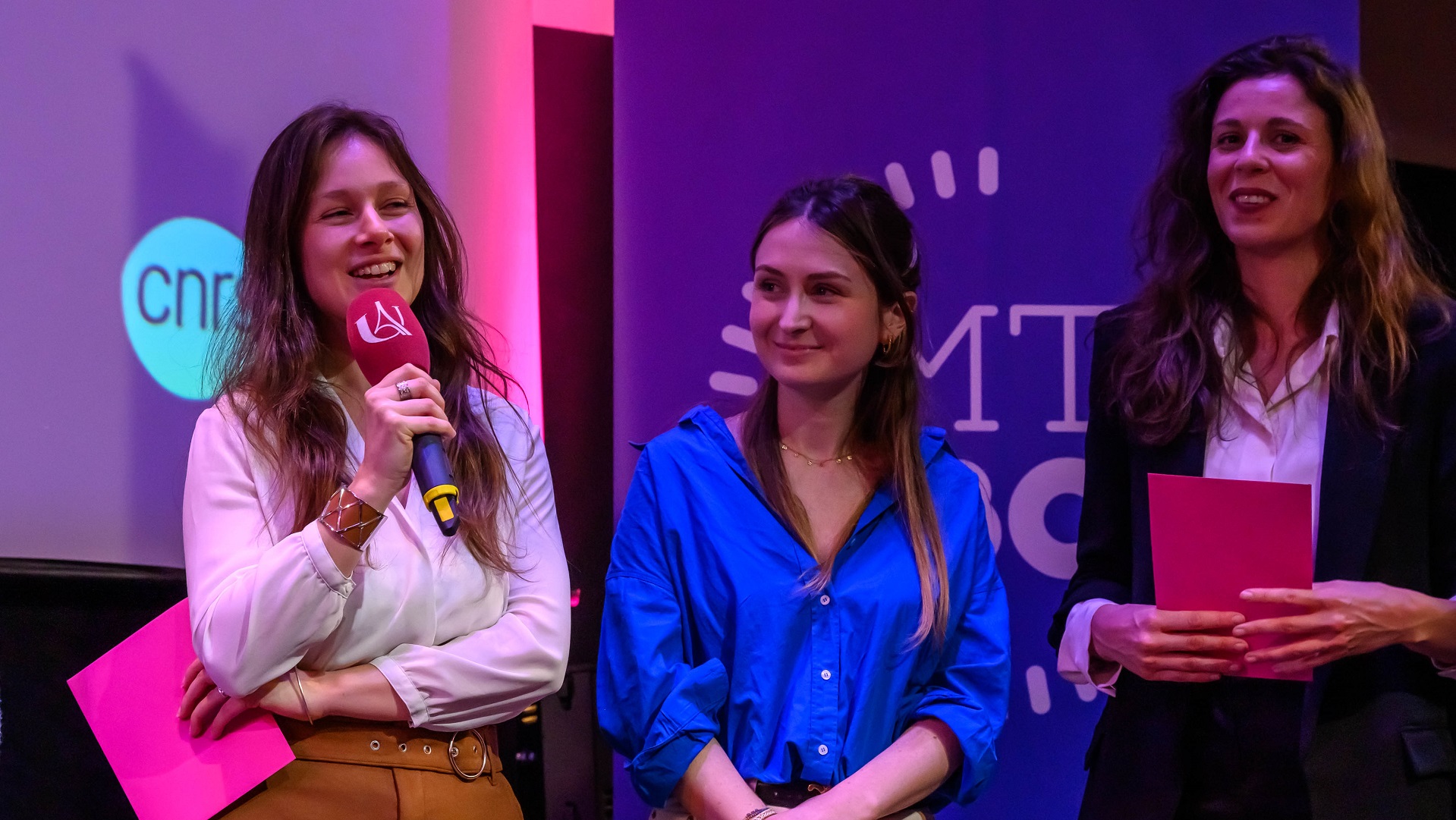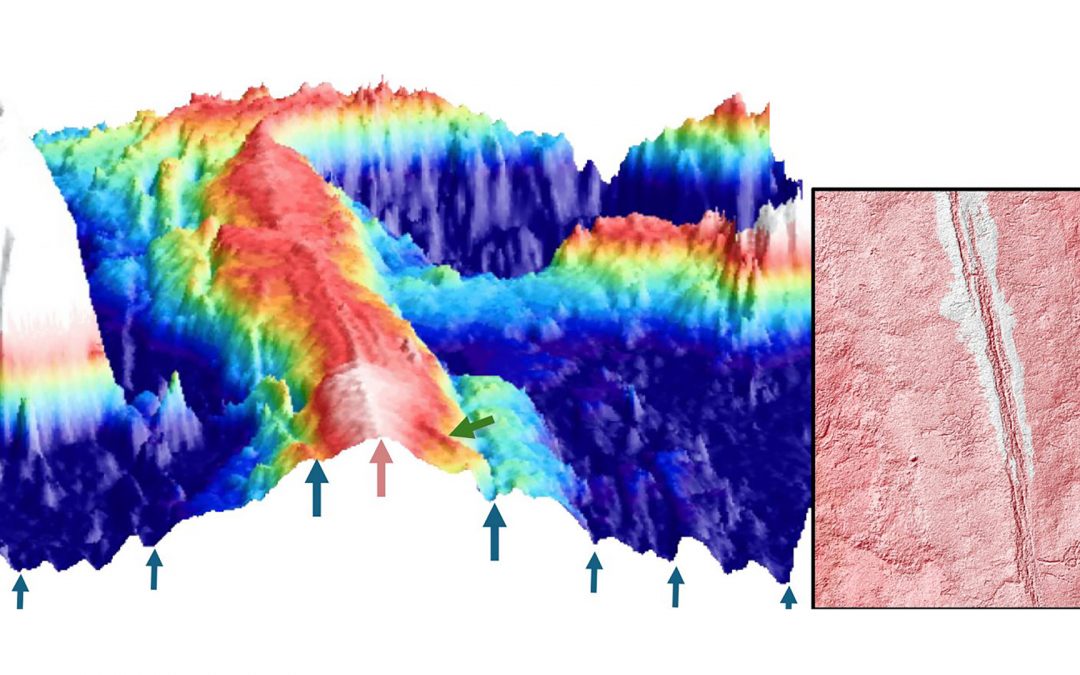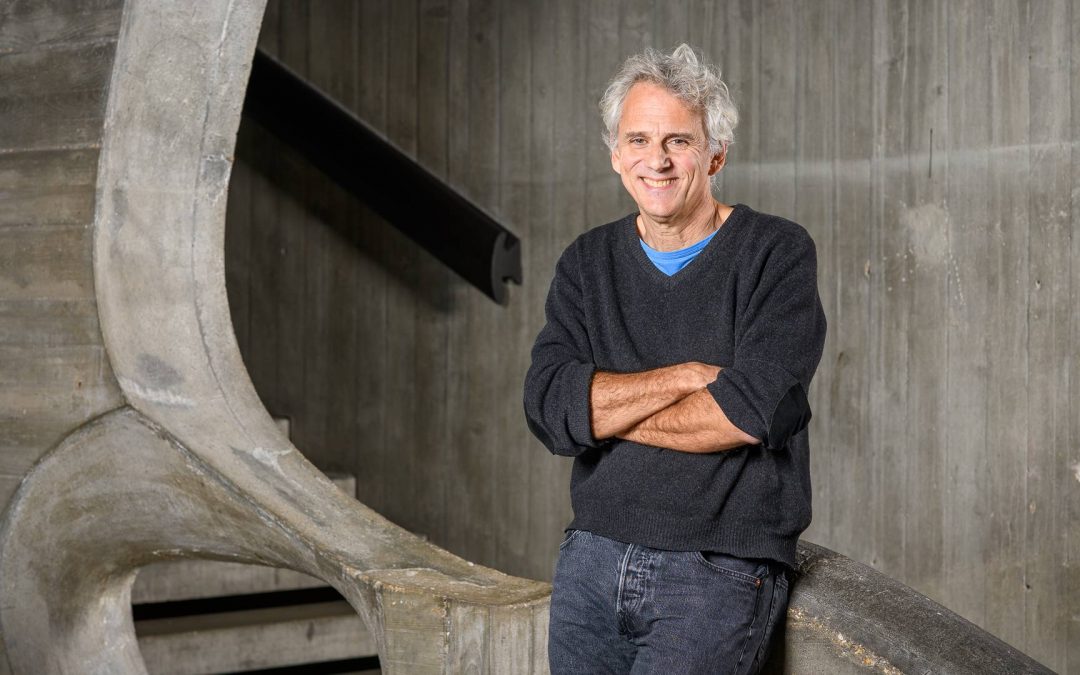Congratulations to Camille Lakhlifi, Marie-Joséphine Crenn, first and second prize winners from the jury and Déborah Birre, the people’s choice award, all three winners on March 16th, 2023 during the ASPC final of the “Ma Thèse en 180s” contest. Université Paris Cité congratulates the 14 candidates for their hard work and high quality presentations.

Camille Lakhlifi, first prize, Marie-Joséphine Crenn, second prize, Déborah Birre, people’s choice
My Thesis in 180 seconds (Ma Thèse en 180s) is above all a contest of eloquence. It is a means of communicating scientific information, making it known and understandable beyond academia. During this edition, the 14 finalists impressed the jury with the quality of their work. Choosing between them, deciding on only two prizes, was a complicated task.
During the final, 160 participants attended in person and 550 people followed live on Youtube. When it came time down to decide on the people’s choice award, 269 people voted.
According to the national rules, Camille and Déborah will defend PHAC’s colors on March 29, 30 and 31 in the national semi-final.
The day after winning, Camille and Déborah agreed to answer our questions.
What motivated you to participate in this contest?
CL: At the end of my thesis, I plan to focus my professional career on the application of scientific methods and knowledge in society, at different levels and on various themes. This type of mission, at the intersection between research and public as well as private structures, requires a solid capacity for summarising and popularising: this is why I wanted to be motivated and coached to think about a very short and simple way to explain my thesis, if possible with a dash of humor. The idea of having a concise presentation of my thesis that would be filmed and then made available online seemed very useful for the future! Moreover, beyond the doctors on whom I focus my research, the message of intellectual humility (which includes the ability to express a low level of confidence when one is not sure of one’s decisions) is particularly dear to my heart, and this was an opportunity to talk about it to a broad audience!
DB: I became aware of the “MT180″ contest when I was studying for a dual degree in Life Sciences and Geography (Université Sorbonne Paris Nord/Paris 8). At that time, I was very eager to see PhD students talking about advanced research topics and explained in an understandable way for a broad audience. Now in my 3rd year of doctoral studies, I wanted to participate in this contest because MT180 really seemed to me to be an ideal opportunity to communicate about my research beyond the academic sphere. This was my primary motivation: to make my research on the upper limit of the forest and its importance known to a more general audience. Indeed, during my PhD, I had the opportunity to communicate during specialised conferences in my field, to publish in scientific journals, to teach students but I was missing until now an opportunity to convey my work outside the university. This is a challenge when you do research. This first phase of the contest is for me a first step in the world of scientific popularisation. It motivates me to pursue this path.
What did you get out of this contest?
DB: The benefit of this contest goes beyond the simple fact of knowing and applying scientific popularisation methods. It is really an opportunity to make one’s work known to people, colleagues from other disciplines or a broad audience, who would never have had the chance to see my research if I had not participated in this event. This contest and its preparation enabled me to become more comfortable in presenting my research topic to any kind of audience, whether or not they are already familiar with the subject. Finally, I have to say that if participating in MT180 in the third year of my thesis does mean an additional workload, I must emphasise that it led to a greater capacity to reflect on my thesis subject and it became clearer when writing it.
CL: In top of what I expected to learn from participating in the MT180 contest (especially about putting my writing into the right voice and on stage), I was surprised to see that as the preparation evolved, the individual experience turned into a collective one, which made it all the more fulfilling! I was also happy to practice the exercises of body and voice warm-ups before speaking in public (including giving a lecture or an academic presentation!). I really appreciated the slight peak of stress during the half-day before the local final: it’s not everyday that you have such a short time frame and to be so concerned about not stammering!
How did you get yourself prepared?
CL: I first wrote down all the key words that I thought were key to be included in my presentation. I then listed the important concepts and elements of my thesis. I grouped them into different sections (the context, the audience I focus on and why, what was already known, the emerging questions I want to answer, how I go about it, my findings and my conclusions). Then, I had to build clear sentences to articulate my speech, and to refine the language as I practiced and with the help of my classmates as well as with the organisers of the MT180 course. Repetition is crucial to master our text: I tried to practice several times a day every day, first by reading it carefully, then by trying without the text, then by doing something else at the same time, then standing up with a zucchini as a microphone, then finally in front of friends! The experts of the Compagnie Faits d’Âmes guided us tremendously to embody our text with the right attitude, appropriate intonations and to make our movements cyrstal clear for the audience.
DB: During the sessions in the MT180 training, I practiced with my 13 other classmates, presenting our research topics to each other in front of the trainers Cécile and Samia for the writing part and Odile and Clara for the stage performances. We were able to give each other advice on the things we could improve and observe each other’s progress. At the same time, I practiced on my own by presenting my speech to my inner circle, trying to diversify “my audience” to get a fresh look and thus detect the points that seemed to be in need of clarification.
Did this experience benefit you and in what way?
DB: MT180 has been without a doubt an enriching experience both professionally and personally. Foremost, I have to say that this was my first experience in the field of scientific popularisation and I can now say without any question that it is a field in which I will pursue. Moreover, during the training, I met doctoral students and professionals with different profiles and research themes that I would not have known otherwise.
CL: I found the way I went through the experience particularly rewarding: when I started MT180, I had decided that I would follow the training programme and that I would take part in the contest thoroughly, but without putting any pressure on myself, so that the experience would be a pleasure and not become a strain (not always easy for me!). Apart from the slight peak of stress on the afternoon of the contest (which was fun!), I think I managed to stay calm and relaxed. Receiving the first prize by the jury was even more of a surprise, which I try to welcome with as much hindsight as possible: I try to avoid expressions such as “you deserved it” (the antiquated idea of “merit” is not at all appropriate to the society full of inequalities in which we live!), by highlighting the incredible work of my fellow students, my opportunity to be totally supervised for my thesis, and to work on a subject that “speaks to people”!
Would you recommend to doctoral students to take part in the upcoming editions? What would you say to doctoral students and thesis directors who are a little hesitant?
CL: Absolutely! To meet other people, discover new research topics, develop new skills, get a change of scenery, distance oneself from your own subject, get out of your comfort zone, assert oneself in one’s own way of expressing oneself, learn how to better prepare oneself before speaking in public… All this via few sessions, coached by professionals and in a joyful, caring and constructive group atmosphere. For the thesis directors, I simply invite them to think about the idea of participating in MT180 by thinking first of all about the well-being and the empowerment of their students: for a few hours less of concentration “on the substance”, it’s a great boost of motivation and confidence “on the format”, which are just as important to know how to share one’s work! And who knows, maybe your students will be able to give you some tips to improve your next presentations.
DB: I would definitely recommend any PhD student to participate in MT180 and this is the advice I have given to my current undergraduate and graduate students. Moreover, I have noticed that few PhD students from my discipline, Geography, are underepresented (I was the only one at the regional final of the ASPC) and for this reason, I strongly encourage PhD students from all disciplines to participate in this competition. For doctoral students and thesis directors who might have some doubts, especially regarding the quality of a presentation made in a 180-second format, I would tell them to be assured that the format is indeed short but the scientific rigor is intact. Moreover, when I present my thesis to different colleagues during other scientific events or in a less formal way, I do not always have more than 3 minutes to present my subject and convince them of its relevance, hence the importance of being prepared for this exercise!
Read more

Evidence of magmatically induced faults at the East Pacific Rise
By comparison of ultra-high-resolution 3-D seismic imagery and bathymetry data collected at the East Pacific Rise (EPR) 9º50'N, researchers reveal the existence of magmatic induced faults near the ridge axis.
read more
Convergences: A Strategic Alliance paving the Future of Biology-Health Research
A key milestone for the partnership between Institut Pasteur and Université Paris Cité, the first “Convergences” scientific seminar took place on June 17th at the university’s head office at Odéon.
read more
Université Paris Cité receives 2 grants from Marie Sklodowska Curie Actions programme !
The results of the MSCA Staff Exchange 2023 call for proposals were published on May 28 2024. Université Paris Cité congratulates its two winners, Sylvain Chaty, Professor and Vice President for Culture, Science and Society at the AstroParticle and Cosmology...
read more
MENTOR: Winner of the MSCA Doctoral Networks 2023
When abnormally activated, the mTOR protein can contribute to the development of cancers and certain monogenic diseases that affect around 2 million people worldwide. The multi-disciplinary MENTOR project, which stands for Metabolic control of cell growth by mTOR in...
read more